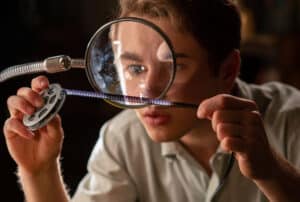
The Fabelmans
1952. Sammy Fabelman is six years old and doesn’t want to go to the cinema, he is afraid to face that world of giants. His mother assures him that movies are unforgettable dreams, his father reassures him by describing the prodigy of a machine that makes still images move. In front of their child, Mitzi and Burt each assume their own role: poetry on the one hand, technology on the other. In room Cecil B. DeMille’s Greatest Show on Earth does the rest. Sam comes out of the cinema and the future is open.
Recruiting classmates and sisters as extras, he begins shooting westerns and war epics in the Arizona desert. In the meantime, the years go by and Sam, a teenager, discovers unsuspected aspects of his parents’ lives in the flow of his frames. The father, a brilliant engineer, would like to follow a promotion in Los Angeles, the mother, a pianist who has given up her career to raise her children, would like to stay in Phoenix. Moving is inevitable, divorce as well. Sam takes refuge in cinema and a summer in 16mm before making it big and making big movies.
He has the strength of a train, that of the origins (L’arrivée d’un train à La Ciotat) and that of Cecil B. DeMille (The greatest show in the world), Steven Spielberg’s vocation for cinema.
The fabulous opening sequence of The Fabelmans lays the foundation stone: in front of the big screen the eyes of the little protagonist widen with fear and wonder at the incredible scene of a train hitting a car on the tracks while it is running. The obsession with that scene will never leave him and he will never stop reproducing it in miniature with his first camera. Here begins The Fabelmans, purely Spielbergian and radically intimate. A film with a high emotional power and full of ellipses that ‘fill’ a lack and reconstruct that childhood that the director has never stopped reinventing in his films.
It is a love letter from Spielberg to his parents, The Fabelmans, to his mother in particular, to whom the film is dedicated. The author is in full possession of his abilities, serene and finally ready to shoot ‘his’ elegiac and sunny story, crossed by a happy melancholy. Spielberg is everywhere, in the narration that he writes together with Tony Kushner (Munich, Lincoln, West Side Story), and in the less (apparently) spectacular and sensitively personal form.
Indiana Jones’ father signs a fictionalized autobiography, an introspection, an encyclopedic dictionary of the themes and motifs he has cultivated for more than half a century: the wondering faces of children, eyes wide open and mouths ajar, dialogue written as maxims (” It’s not enough to love something, you have to know how to take care of it…”), the loss of domestic comfort as an irreparable trauma, the comparison of wimpy geniuses with idiot dudes and that incredible visual sense that allows them to invent dazzling images. One above all: the hands of a child that form a screen to gently welcome a trembling frame, like a chick pulled out of its shell.
Spielberg is all there, ‘in a fist’ and in a film that deals explicitly with his childhood for the first time. No aliens to divert the story. Above all, the director explores the gray areas because under the joie de vivre of the ‘fabulous Fabelmans’, as Orson Welles would have called it, secrets and wounds are hidden.








